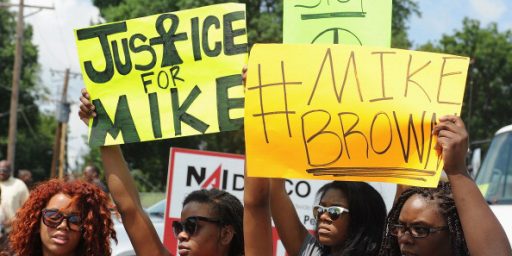Bush Gets Legislative Victories
Despite sagging poll numbers and not being eligible for re-election, President Bush has secured several legislative wins in recent days, surprising his critics. Or at least the Associated Press.
Newsview: Bush Gets Wins Under His Belt (AP)
After a rocky start, President Bush is scoring legislative wins that could be important tests of his ability to push laws through Congress in his second term. While his centerpiece proposal to restructure Social Security continues to languish, Bush’s close victory on a trade bill and his progress on energy and highway legislation are quieting talk that he is a lame duck already.
His nomination of conservative federal appeals court Judge John Roberts to the Supreme Court also seems to be on track, despite skirmishing with Democrats over access to papers from Roberts’ work as deputy solicitor general in the first Bush administration.
With Washington summer vacations looming, Bush and his Republican allies on Capitol Hill were encouraged on Thursday that a few things were finally going their way — a welcome break from unrelenting bad news from Iraq and the firestorm over whether Bush aide Karl Rove helped disclose a CIA officer’s identity for political purposes. “I think they’ve shown themselves to be very resourceful,” Rutgers University political scientist Ross Baker said of the president’s team and other GOP leaders. “Particularly, I think you have to credit the leadership of the House.”
[…]
The legislative victories come as Bush’s job approval percentage hovers in the 40s. His rating in some polls is near the lowest levels of his presidency. That’s in spite of some positive recent developments. The budget deficit is smaller than expected, and by most measures the U.S. economy is improving. Ties with Europe are on the mend. North Korea is back at six-nation talks on ending its nuclear program. And China has agreed to a small revaluation in its currency after heavy Bush administration pressure.
“Bush has had some good things happen,” said pollster Andrew Kohut, director of the Pew Research Center for the People & the Press. “But they don’t speak to the largest problems the public is having with the administration.” Topping those are the Iraq war and “continued uneasiness with economic conditions, even though the economy by the standards of economists is not all that bad,” Kohut said.
Aside from wars, most people pay scant attention to matters of foreign policy. It’s hardly surprising that the steady drip of bad news from Iraq combined with worries over the economy pushed by an inflation obsessed Federal Reserve Board are overshadowing important but lower profile successes in the public’s mind.
Bush will likely get at least a token Social Security reform bill passed but it will look little like the grand redesign he initially proposed. He may lose on stem cell research, the Bolton nomination, and some other issues. He’ll nonetheless get a lot done because he’s got the confidence of his party’s leadership in both Houses of Congress, which his party controls.
Ultimately, though, his presidency will be judged based on his handling of the war on terror generally and the Iraq War in particular. If U.S. forces are out of Iraq, or even down to a token presence, by the end of his term and the country is a functioning democracy, he’ll be considered a pretty good president in the judgment of history. If not, he’ll be thought of as someone with grand ambitions whose reach exceeded his grasp.
Update: NYT’s Richard Stevenson offers a story very similar to AP’s: Despite Problems, Bush Continues to Make Advances on His Agenda (RSS)




